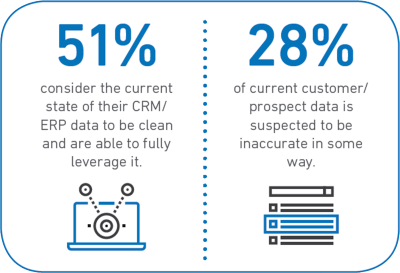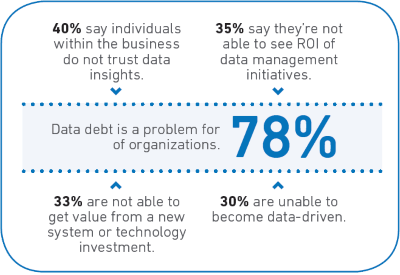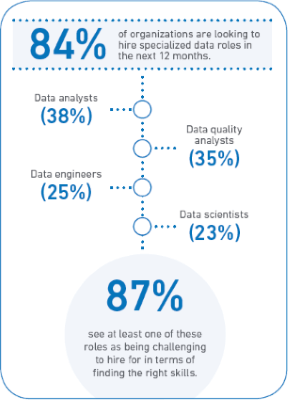- Products

Enjoy a free 30-day trial of our
data validation software.Experience the power of trusted data
solutions today, no credit card required! - Solutions

Enjoy a free 30-day trial of our
data validation software.Experience the power of trusted data
solutions today, no credit card required! - Partners

Enjoy a free 30-day trial of our
data validation software.Experience the power of trusted data
solutions today, no credit card required! - Learn more
- Pricing
- Contact Us
Highlights from our 2020 Global data management research
It’s Christmas in February! Well, not really. However, it is what I feel like every year when we get to our annual benchmark report. As you may know, each year Experian talks to more than a thousand practitioners around the globe around data demands and usage, data management practices, and challenges to leveraging this valuable asset. This year marks 10 years for this study, and I can personally say we have seen a lot of changes and some consistencies over the past decade.
The demand for data-driven insights and innovation has never been higher. Maintaining a competitive edge in today’s digital landscape hinges on the ability to leverage accurate and reliable data to make informed and strategic business decisions. Data has grown exponentially in the past decade, but so has the appetite for information across all areas of the business. While some data management principles have remained unchanged, the individuals using and leveraging data insights have changed dramatically. Data insight is no longer just for IT or senior management, it is for the call center representative, operations manager, and compliance officer. This brings new challenges to how we manage and maintain information.
There are three major takeaways from this year’s study:
1. There’s a continued shortage of trusted data—and meaningful insight.
While it’s widely understood that trusted data is essential for an increased competitive advantage in areas such as customer experience, data governance, AI innovation, and operational efficiency, most companies still lack trusted information.
Over the past several years, we’ve seen the level of inaccurate customer and prospect data stay stagnant at nearly 30 percent. Not only does a distrust in data result in wasted resources and an inability to rely on analytics, but poor data also negatively impacts organizations in terms of key data-driven initiatives like machine learning. This isn’t just unstructured or obscure data. We see that half of companies this year do not trust data in their CRM or ERP.

2. Data debt continues to pile up and drag down the ROI of key initiatives.
An overwhelming majority of organizations are challenged with a backlog of data debt, and they do not know how to tackle this challenge or have a plan in place to address it. Meanwhile, data debt—the result of suboptimal governance of quality data—bogs down data management initiatives like machine learning, artificial intelligence, and prioritizing preparing data for analytics. Additionally, 33 percent of organizations find they are unable to get value from technology investments.
Business leaders often underestimate the level of data debt within their company and do not realize it drags down the benefits of not only data-type initiatives but also daily business operations or broader critical investments. 
3. Organizations still need to address new data users and practitioners.
Data usage is changing and expanding. While many organizations have invested in new data management technology, many have not invested in the specialized skills and talent needed to manage these programs. Only around half of organizations currently have a chief data officer, a role that is integral to developing a data-driven culture across the broader business. In fact, we see that when a CDO is present, companies are more likely to have a CRM they can leverage, monetize data assets, and be sophisticated in data management practices. Filling the seat of the CDO and hiring supporting roles such as data analysts, data stewards, and data engineers are a top focus over the next 12 months.
There is also a general lack of understanding around data within the broader business, which is essential to becoming a data-driven organization. Luckily, businesses are starting to invest in data literacy—the ability to read, work with, analyze, and argue with data. Eighty-four percent see data literacy as a core competency that all employees need to have in the next five years.
Data usage is changing and expanding. While many organizations have invested in new data management technology, many have not invested in the specialized skills and talent needed to manage these programs. Only around half of organizations currently have a chief data officer, a role that is integral to developing a data-driven culture across the broader business. In fact, we see that when a CDO is present, companies are more likely to have a CRM they can leverage, monetize data assets, and be sophisticated in data management practices. Filling the seat of the CDO and hiring supporting roles such as data analysts, data stewards, and data engineers are a top focus over the next 12 months.
There is also a general lack of understanding around data within the broader business, which is essential to becoming a data-driven organization. Luckily, businesses are starting to invest in data literacy—the ability to read, work with, analyze, and argue with data. Eighty-four percent see data literacy as a core competency that all employees need to have in the next five years.

I am incredibly honored to have been working on this report for the last decade and hope you will take the time to review our latest release. Harnessing the true power of your organization’s data starts with building trust in data, addressing a rising level of data debt, and filling a data skills shortage. While becoming a data-driven business takes time, quick wins in these areas can help build the momentum you need to transform your business.


